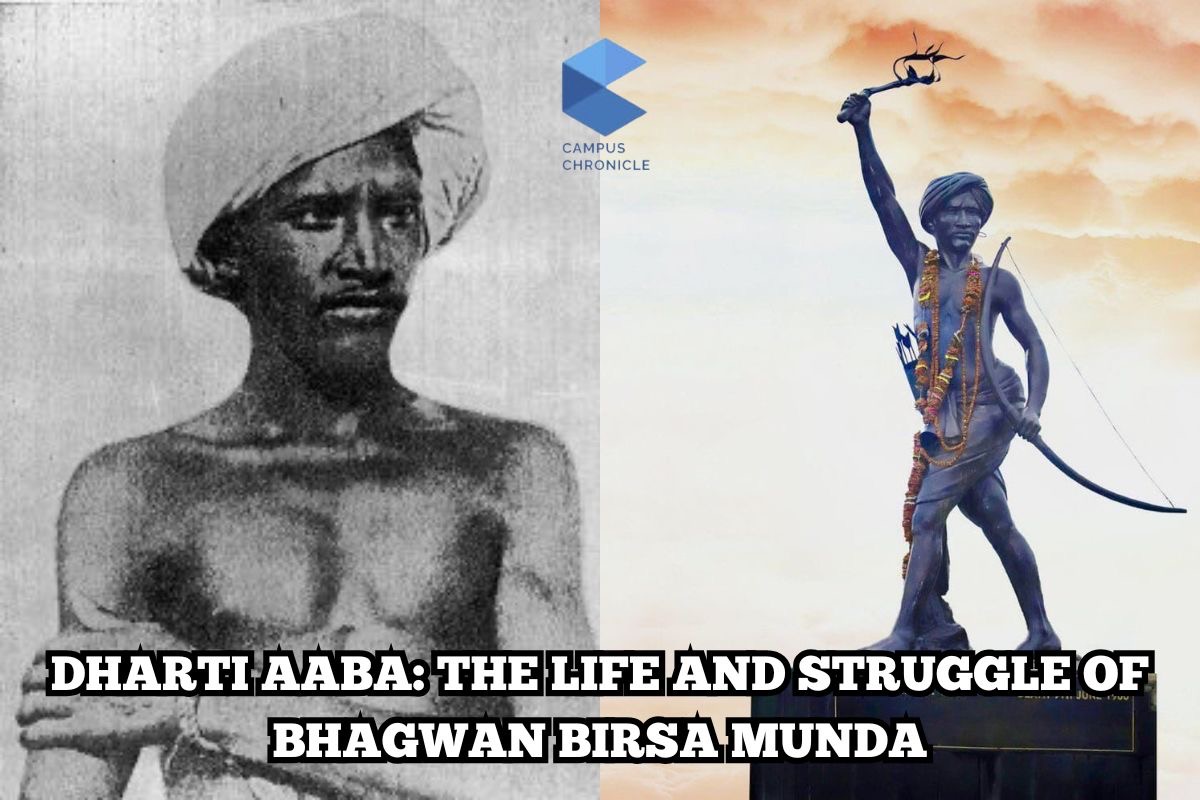By PRAJJAWAL MISHRA
You must have heard the name of Birsa Munda, but not just Birsa Munda, but Bhagwan Birsa Munda ji. His life was only 25 years, but in this short life, he initiated “Ulgulan,” meaning such a great mass movement, which was not just a tribal rebellion but an attempt to save the soul of the entire civilization. Today, when India is moving forward to re-honor its glorious values of diversity and inclusivity, the life of Birsa Munda reminds us of those chapters of freedom that were written in the language of the forests, sung in the songs of the mountains, and fought with bow and arrow, immense courage, and unbreakable faith.
He was born on 15 November 1875 in Ulihatu village of the Bengal Presidency (present-day Jharkhand) in a Munda family. He too was an ordinary human being, but it was the primacy of his actions that caused him to be called ‘Bhagwan’ today. His story began from that same tribal belt of modern Odisha, Bihar, Jharkhand, Madhya Pradesh, and Chhattisgarh, where he was known.
Through its efforts, this organization continuously inspires a sense of pride in tribal heritage and generates awareness about the importance of ecological balance and cultural self-respect—values for which Bhagwan Birsa Munda sacrificed his life.
During the period of colonial rule, tribal societies had to face severe hardships like forced displacement, eviction from forests, and the erasure of cultural identity. Policies like religious conversion and eviction from their traditional lands were tools to end their autonomy. Bhagwan Birsa Munda, known as “Dharti Aaba” (Father of the Earth), stood up against these injustices. His “Ulgulan” movement was not just a demand for freedom from the British; it was a call for the reclamation of dignity and self-respect. Although he fell victim to British powers, his resistance became a light that illuminated the path of countless freedom fighters. The struggle of Bhagwan Birsa Munda became a symbol of the rise of national consciousness in India.
When we commemorate the death anniversary of Bhagwan Birsa Munda every year on 9th June, it is our duty as a society and a nation that his legacy does not remain just a formality. It must become a source of inspiration—in the formulation of strong policies, in the protection of land rights, in reforming forest governance, in ensuring inclusion in education and health, and above all, in protecting tribal languages, traditions, and perspectives.
Between 1886 and 1890, Birsa Munda spent a long time in Chaibasa, which was the main center of the Sardar movement at that time. By 1890, he had become deeply active in protesting against British atrocities. The Munda community traditionally was the joint owner of the land under the “Khunkhatti” system. The British replaced this arrangement with the “Zamindari system,” which allowed outsiders to enter these areas. These external bases, with the help of the British, exploited the local tribals. The Mundas, who were earlier landowners, gradually became laborers and were pushed into poverty.
In reaction against this very Zamindari system, or permanent settlement, in 1894 Birsa Munda declared a revolt against the British and the “Dikus” (outsiders), which was called “Ulgulan.” Fear spread among the Christian missionaries, as Birsa became a major obstacle in the path of their conversion campaigns. Many Christians, influenced by his movement, also joined the Mundas.
In 1895, Birsa was arrested and was released after two years. After his release in 1897, he reorganized the movement and went underground to prepare for war against the British. By 1899, he had prepared an organized army of trained tribal soldiers. On 24 December 1899, Birsa Munda blew the bugle of revolt by attacking police stations and churches, in which some policemen were killed. This Ulgulan spread to most parts of the Chotanagpur region.
For the next two years, Birsa Munda fought a decisive war with the British. The British forces tried to suppress the rebellion with full force and killed hundreds of tribals. Birsa Munda strategically retreated to the hills of Singhbhum. On 3 February 1900, he was captured by the British from the Jamkopai forest in Chakradharpur. On 9 June 1900, he died in Ranchi jail under mysterious circumstances at the mere age of 25.
Recently, the Government of India has taken several meaningful steps to bring the legacy of Bhagwan Birsa Munda and other tribal heroes into the national consciousness. In the year 2021, Prime Minister Narendra Modi paid homage on his birth anniversary—15 November—and declared this day as “National Faith Day.”





